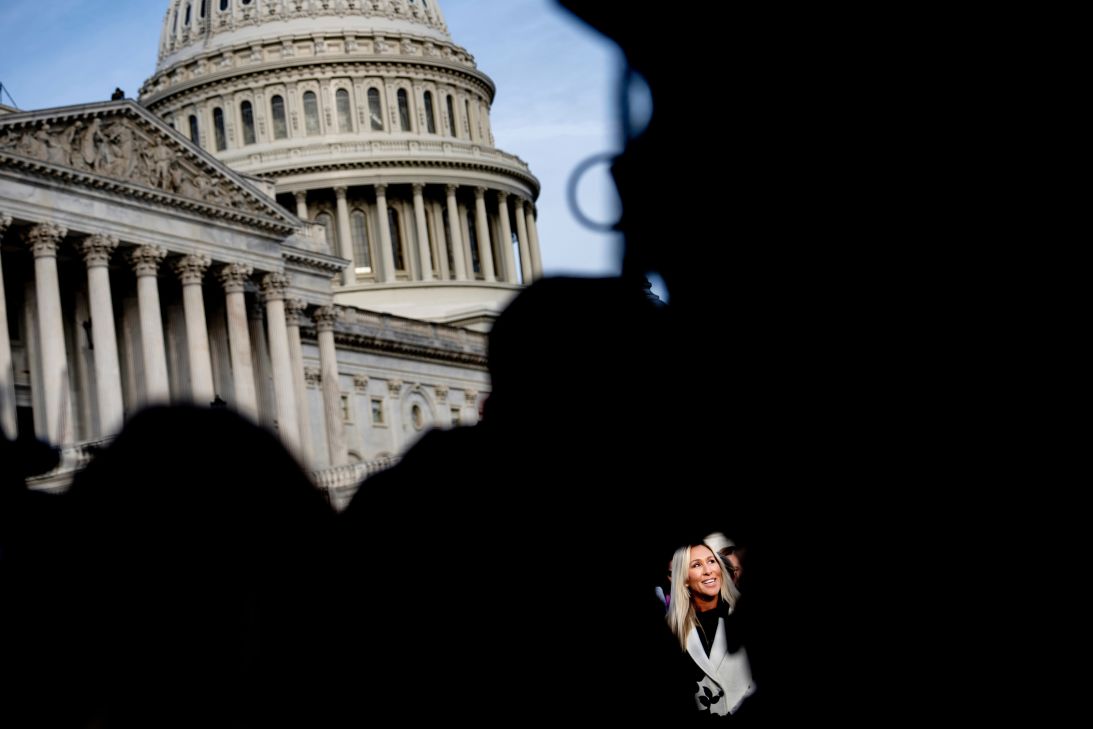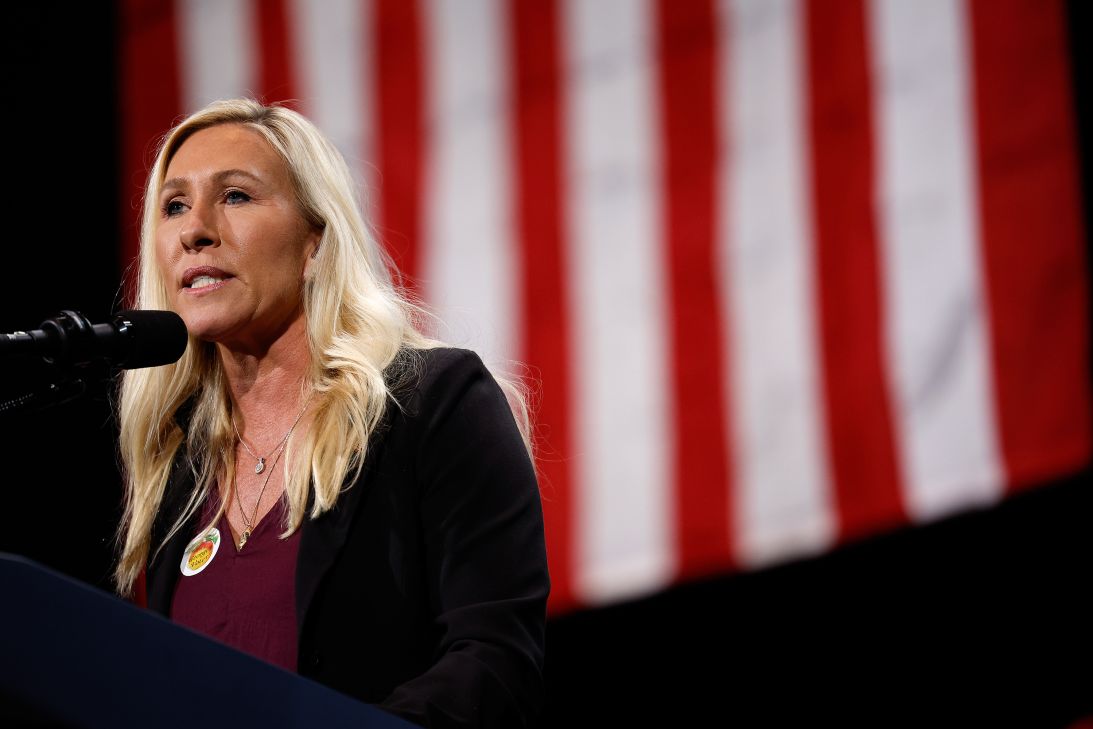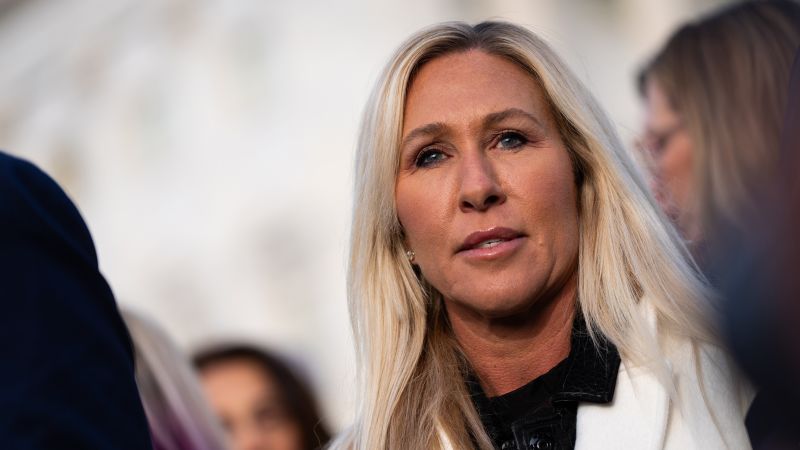Marjorie Taylor Greene’s shock announcement of her exit from the House of Representatives after a feud with Donald Trump shows the president still has power to punish challenges to his authority in the Republican Party.
But if his quest for total loyalty means Trump ignores the substance behind the complaints of the Georgia representative who was once one of his fiercest supporters, then he will lead his party down a risky road.
Greene on Sunday pushed back against reports that her departure from Congress in January is the precursor to a run for president in 2028, insisting in a lengthy post on X that she was “not motivated by power and titles.”
Given her apparent disgust with politics, her party and Washington in general, it might be wise to take her at her word. Still, her X post, along with a video and the long statement in which she made her announcement Friday, didn’t sound like someone who is leaving public debate or “America First” principles behind.
Whether Greene’s future lies in a conservative media role or in a political campaign, she took positions on Social Security, health care, immigration, foreign policy and the national debt that sound very much like a manifesto for a back-to-basics shift for the MAGA movement when Trump has left the scene.
Greene’s falling-out with Trump has created so much interest because it’s a fracture between two of MAGA’s top personalities, but also because it seems to hint at deeper rifts in the movement itself. And since she was once an enthusiastic player in the “toxic” politics pioneered by Trump and for which she apologized on CNN’s “State of the Union” last week, Greene’s turn may hint at a wider fatigue for the drama and bile that Trump whips up every day.

There are two theories circulating in Washington about Greene’s behavior.
► One is that the showdown and her exit prove that Trump’s iron grip on the party is as tight as ever. In this version, Greene will follow Trump critics like former Rep. Liz Cheney, former Sen. Jeff Flake and others who were effectively driven out of public office by the president’s attacks. By turning on Greene, the president demonstrated to every other GOP lawmaker what happens if they cross him.
Greene’s distaste for fighting a Trump-backed primary challenge, as expressed in her resignation announcement, will resonate among lawmakers who know the biggest threat to their jobs is losing in a GOP primary rather than in a general election after years of gerrymandering of congressional districts.
► An alternative possibility is that for Trump to become estranged from someone who was once as outspoken in his support as Greene, there must be genuine fissures in the party and the movement. The split has coincided with a slump in Trump’s national popularity a year after his reelection; suggestions that he’s becoming a lame duck; and an unprecedented revolt, in which Greene played a leading role, against Trump by the Capitol Hill GOP over the Jeffrey Epstein files.
There are likely elements of truth to both theories. It was never realistic that a lone member of Congress, even one as astute in cultivating publicity and controversy as Greene, would prevail in a political test of wills with a president — let alone one who transformed the GOP in his image, created his own populist movement and enjoys an exceptional bond with the grassroots of his party. But Greene argues that the president has departed from the values that took him into office and that validate his appeal. That’s a threat to Trump’s authority at a difficult political moment and a time when the power of second-term presidents often starts to ebb.

Making Greene’s life so intolerable that she’s driven out of Washington may represent an attempt by Trump to delay the waning of his political powers. But when revolutionaries start fighting over the meaning of the revolution, it’s usually a sign that their political project is in trouble.
Greene’s rebellion is not the only force tearing at GOP unity. A raging controversy over White nationalist and Holocaust denier Nick Fuentes has dragged in the Heritage Foundation, the conservative think tank behind much of Trump’s domestic program. There’s also growing criticism of Trump from the community of podcasters popular with young White men, which played an important role in his 2024 election triumph.
And Greene’s critique of Trump runs deeper than policy. She has complained about the impact of his cutting personal attacks on television and social media, warning that he has put her safety at risk, an experience that led her to reconsider her own past conduct. She accused Trump of dropping tens of millions of dollars against her in an attempt to “destroy” her politically. “It’s all so absurd and completely unserious. I refuse to be a ‘battered wife’ hoping it all goes away and gets better,” she wrote in her resignation statement.
Greene’s complaints about the impact of Trump’s attacks aren’t getting much sympathy from some of her Democratic adversaries. “I was like, ‘You have got to be kidding me,’” Democratic Rep. Jasmine Crockett of Texas told Jake Tapper on CNN’s “State of the Union” on Sunday.
“You’re on the other side of the president for one week and you can’t take the heat. Imagine what it is to sit in my shoes, to not only be on the opposite side of him, but to have people like her who are constantly fanning the flames of hate,” Crockett said.

Greene’s immediate political prospects look unpromising — one reason her denials that she’s seeking a political reinvention in a new race may be taken at face value. Her prospects of a successful run in a party where she may be seen as disloyal to Trump seem remote, although the political ground could shift before the 2028 presidential primary race really cranks into gear.
The Georgia governor’s race is already crowded ahead of the Republican primary. A statewide race might in any case be challenging given the likelihood her extreme political past would alienate moderate swing voters, even if she’s reshaped her image in Washington.
Trump insisted that the root of Greene’s MAGA apostasy was thwarted ambition since he’d told her not to run for Georgia governor or US senator. She insisted that she had no designs on any other political positions. But she’d not be regarded a favorite for any step up in Georgia.
Still, by leaving Congress now, she can distance herself from the possible 2026 Republican loss of the House that she predicted when she resigned. And she’s positioned herself to be seen as one of the first Republicans to warn of impending disaster if a political postmortem begins.
Moreover, after Greene’s recent tensions with House Speaker Mike Johnson, her departure will make his life even more miserable, narrowing his tiny Republican majority.
Trump told ABC News on Friday that Greene’s resignation was “great news for the country.” But perhaps he shouldn’t celebrate too soon. Greene was, after all, part of the coalition that inflicted his most severe defeat by Capitol Hill Republicans, who backed a bill requiring the Justice Department to release the Epstein files — a step he had long resisted. Apart from the humiliation, the new law he signed last week worsened his political headache on the issue.

And Greene, channeling the views of voters in a district that she won with a huge majority last year, has forensically criticized Trump. She’s warned that the administration is gaslighting Americans over prices and accused the Republican Party of doing nothing to alleviate the plight of Affordable Care Act policyholders who are seeing the cost of premiums double in some cases. And she’s criticized Trump’s search for a foreign policy legacy as antithetical to the principles of the “America First” movement, which prioritizes domestic concerns.
If Republican voters broadly share her concerns — which are mirrored across a far wider political spectrum than the MAGA movement, according to polls — enthusiasm for party candidates could dip to dangerous levels in the midterm elections.
Trump’s attempts to address the affordability crisis have been lamentable: He’s claimed that Americans struggling with the cost of living are living in an economic golden age. It’s not hard to see that Greene is far more attuned to the reality of much of the country than Trump, a billionaire who lives a gilded lifestyle and surrounds himself with wealthy acolytes and sycophantic officials.
There’s also something deeper to Greene’s recent comments. She diagnosed a political system that is failing millions of Americans. She argued the country’s leaders are negligent in assessing Americans’ most basic needs: on health care, feeding their kids, financing college and offering a viable future in which they can bring up their own young families.
Whether or not she runs for president in 2028, Greene has already hit upon the likely theme of the next race. And it’s one that resonates far beyond the MAGA movement.
Greene came to Washington after winning election for the first time in 2020 as a firebrand purveyor of absurd conspiracy theories and a proponent of the QAnon movement. She once regarded Trump as the greatest president of her lifetime.
Her departure less than a year into Trump’s second term is damning commentary on his presidency.

